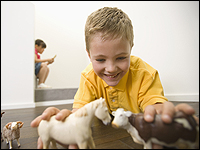Pedagogy and Play: Creating a Playful Curriculum for Academic Achievement and Engaged Learning
 CHA P T E R 4
CHA P T E R 4
Pedagogy and Play: Creating a Playful Curriculum for
Academic Achievement and Engaged Learning
Brock R. Dubbels, PhD., Dept. Psychology, Neuroscience, & Behavior, McMaster University, Hamilton,
ON, Canada, Dubbels@McMaster.ca
Key Summary Points
Using instructional techniques based upon play can improve achievement. Standardization has created more problems than it solved. Three case studies are presented as demonstrations of the framework. When children engage in complex peer play, they exhibit greater gains in levels of symbolic functional and oral language production.
Key Terms
Play, Assessment, Learner Centered Practices, Instructional Communication, Curriculum, Cognitive, Affect, Classroom, Instructional Design, Learning
The Benefits of Play
Play is not only an imaginative activity of amusement. Play and games serve important roles in cognitive, social, and affective development (Dubbels, 2014; Fisher, 1992; Frost, 1998; Garvey, 1990). In pre-industrial times, pastoral and foraging societies, children did not learn sequestered away from adult contexts (Thomas, 1964). Instead, children participated in playful variations of adult activities, where they could observe adults at work, and were able to imitate and emulate these activities through play without the danger of failure and consequence (Bock, 2005; Rogoff, 1994). Rubin, Fein, and Vandenberg provided a thorough psychological overview of the early role of play in their chapter in volume four of the Manual of Child Psychology (1983). They observed that humans play longer relative to other mammals that play. Lancaster and Lancaster (1987) built upon this position and state that this extended period of play is essential for development. Bjorklund, (2006) expands upon this view, and states that humans play longer because they are adaptive organisms, and, that extended play is essential, allowing humans the skills and knowledge to become independent in complex environments. When children engage in complex peer play, they exhibit greater gains in levels of symbolic functional and oral language production, as compared to if they are interacting with an adult (Pellegrini, 1983). Additionally, when a learner experiences learning through play, where they can experience and roleplay adult work, they report the activities are more meaningful, and that the activity did not feel like learning (Dubbels, 2010). This aligns with Winkielman & Cacioppo, (2001), who found that when learning new information is experienced as easy, processing is experienced as pleasant and effective.






